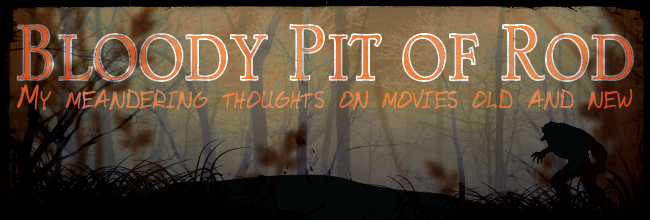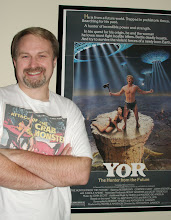Given a title that has very little relation to its
content, Cannibal Man is not the gut-munching splatterfest you might
expect. Instead it's a thoughtful, intelligent and deliberately paced study of
one man's descent into madness and is much better served by the alternate
title Week Of The Killer. The film bears more resemblance to
Polanski's Repulsion than the gross-out cannibal movies that
stampeded through exploitation theaters in the late '70s and early '80s. Rather
than those movies I was surprised to find myself thinking of a line from Alfred
Hitchcock's 1943 film Shadow of a Doubt. In that movie a serial murderer
of rich old ladies asks what the pleasant facades of middle class homes hide
and what ugly things you might see if the fronts were ripped off those houses.
In the Hitchcock story the killer is a man from modest means whose maniacal
disgust with idle rich women drives his desire to kill. Here we have killer
driven by fear committing a string of atrocities but silently watched through
that fake calm front his house affords. But behind the walls of this poor man's
home death piles up all because our anti-hero believes (probably correctly)
that someone like him won't be afforded justice.
Marcos (Vincente Parra) is a man on the fringes of
Spanish urban life. He works in a slaughterhouse and shares a rundown house
with his older brother. Their home is in an area of the city in which expensive
high rise apartment buildings are springing up and pushing out the older
residents. This house is one of the last of the older dwellings in the
neighborhood and looking up at the new complexes Marcos knows his place in the
world as a poor man every day. He's dating the very lovely Paula (Emma Cohen)
but she knows her father won't approve of Marcos and has kept their romance a
secret. One night while on a date together they are insulted and assaulted by a
cab driver. This older fellow is offended by their public displays of affection
and in the ensuing altercation Marcos brains the man over the head to protect Paula.
The next day’s newspaper reveals that the cab driver died from the blow. Paula
thinks they should go to the police, explain what happened and try to put it
behind them. But Marcos insists that he will never be believed and when he
realizes Paula will go to police with or without him, he strangles her. Clearly
puzzled by his own actions, he places her body in his bedroom and carries on
with his life.
Marcos' brother has been out of town on a job. When he
returns a day early and discovers Paula's corpse he is stunned and tries to
convince Marcos to go to the cops. The siblings argue and when things are done
Marcos is laying his brother's body in his bedroom as well. At this point
things become complicated as his brother's fiancée Carmen shows up looking for
her future husband. A forceful woman with a dim view of men she can’t be
stopped from searching the house and soon her body is added to the pile.
Marcos continues to go about his usual life, working,
eating in a local restaurant and fielding the flirtatious advances from
beautiful waitress Rosa. He seems to be trying to figure a way out of his
problem but the next day Carmen's father shows up in a fury looking for his
missing daughter. Once again Marcos resorts to violence and now he has four bodies
in his bedroom. Finally he gets an idea about how to deal with this situation.
He begins dismembering the bodies and taking the pieces to the slaughter house
each day inside a duffel bag. There he feeds the parts into the machinery that
processes the beef, neatly getting rid of the evidence.
Over the course of these few days Marcos keeps meeting one
of his neighbors from the nearest high rise apartment building. Nestor (Eusebio
Poncela) is a polite but talkative man who lives on his own. He goes out of his
way to befriend Marcos and by the time he casually says of his neighbor's
unspoken problems, "You should bury them," you suspect he
knows the bedroom's terrible secret. It slowly becomes clear that Nestor is a
homosexual and it's his own outcast position in Spanish society that leads him
to overlook Marcos' crime. Nestor might even be looking for help from his new
friend but it only becomes clear what kind as the men become closer. As the
smell from the rotting bodies gets to be difficult to conceal, Marcos' problem
may have grown too large to escape detection. Soon the missing people are going
to cause the police to investigate and Marcos has to make a decision.
One of the best surprises of this very good film is the
restraint with which the gruesome tale is told. Even though this a story about
a man who kills half a dozen people there is never a feeling of sleaze or
exploitation. While there are some bloody moments the film is light on
violence. Much more interested in studying its main character's mental
deterioration than shocking an audience, the movie works its magic by drawing a
portrait of a desperate man pushed by fear into horrible crimes. It's a
testament to writer/director Eloy de la Iglesia's skill that we find Marcos
more sympathetic as the story goes on instead of less. His acts are
terrible — the most heinous act a human can do — but his
reasons are understandable. He knows he'll never get justice in the
repressive culture of Franco's Spain .
The film shows several scenes of daily life around him that make his place in
society clear — he had no real future from the moment he struck that cab
driver.
This is a dark, sad film that ultimately becomes about
two men from opposite ends of society who are outsiders for different reasons.
Neither man can really help the other. But they can at least find a
friend — someone to talk to — before they succumb to the
inevitable end the world has condemned them to.
















5 comments:
Do you like the Italian cannibal movies from the 70's and 80's?
I am a fan but not a rabid one. Even the ones I like are often one watch movies - no desire to revisit them in general.
I'm curious to know which ones you like and dislike. Last Cannibal World is the best one in my option. I enjoy popping that one on often. Cannibal Holocaust is probably second best, followed by Man from Deep River and Mountain of the Cannibal God. Cannibal Ferox and Eaten Alive are sleazy, but aren't very well made. The last two I've only seen once.
I'm a fan of Cannibal Holocaust but its rough watch. Mountain of the Cannibal God is a fun adventure film.
Most people dislike the animal slaughtering. How do you feel about onscreen animal killing? The biggest star that these movies had is Stacy Keach. I wonder why he agreed to do Mountain. Money?
Post a Comment